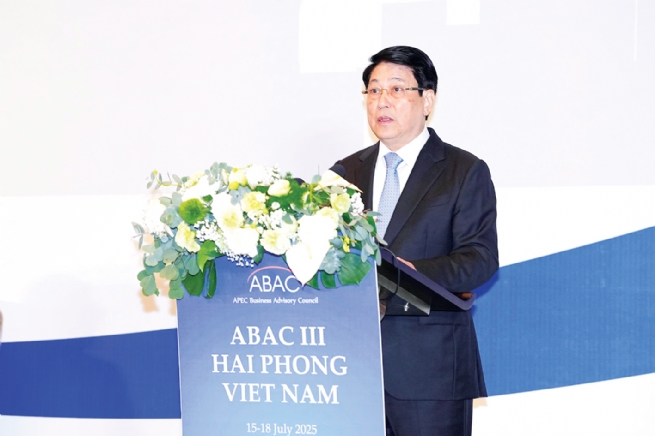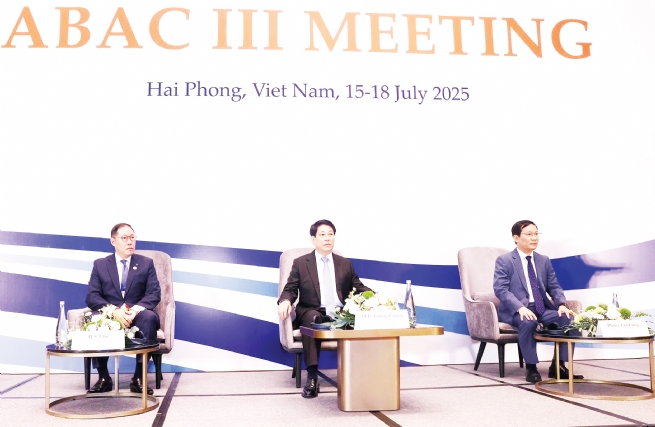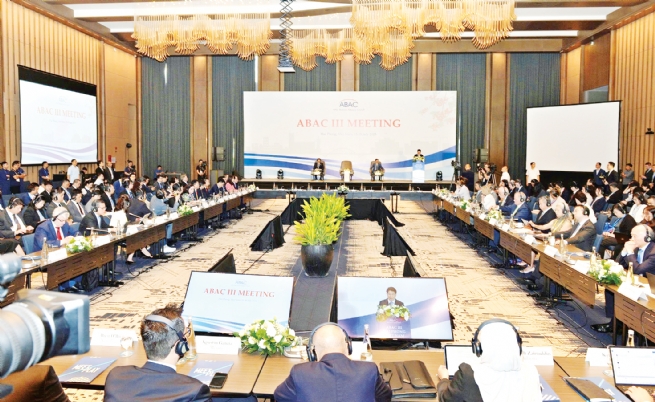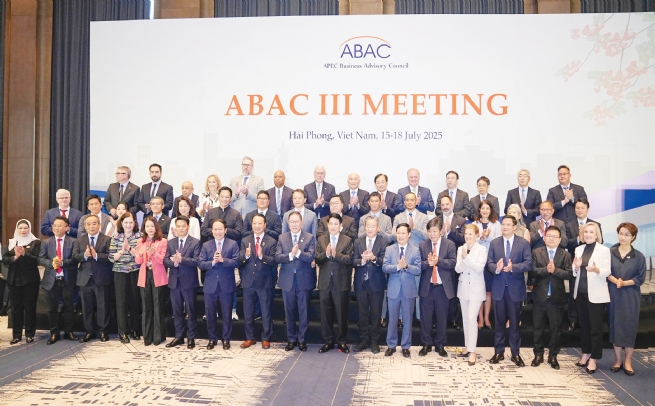ABAC's Initiatives Drive Sustainable Regional Development
On the morning of July 16, President Luong Cuong attended and delivered a speech at the opening session of the third Meeting of the APEC Business Advisory Council (ABAC III) and related events in Hai Phong City.

State President Luong Cuong addresses the ABAC III meeting, Hai Phong, July 16, 2025
The third ABAC Meeting, held from July 15 to 18, was organized by the Vietnam Chamber of Commerce and Industry (VCCI) and ABAC Vietnam in collaboration with the Hai Phong People's Committee. It brought together approximately 200 international and Vietnamese delegates, including ABAC members who are leaders of top-tier corporations, trade and investment promotion agencies from 21 APEC economies, assistants, and international guests. The overarching theme for ABAC in 2025 “Bridge. Business. Beyond” is a message that signifies both connectivity and the aspiration for cooperation to overcome challenges for sustainable development.
Delivering the opening speech, he emphasized that throughout its 36-year development history, APEC has affirmed its role as the region's leading economic cooperation mechanism and a locomotive for promoting growth and integration, and ensured peace, stability, connectivity, and prosperity for the region.

President Luong Cuong (middle) attends the opening session of ABAC III meeting
As the world is facing profound geopolitical shifts, witnessing post-pandemic economic recovery with a lot of potential risks and global challenges such as climate change, extreme weather phenomena, changes in trade policies, and supply chain disruptions, President Cuong stated that multilateral cooperation and public-private dialogue have become even more critical and need to be elevated to a new plane.
He said that, with its role as the official representative mechanism of the business community within APEC and as a key bridge between the private sector and APEC Economic Leaders, ABAC not only proposes favorable policies for the economy but also directly participates in creating practical solutions to strengthen value chains, promote investment, facilitate trade flows, and encourage innovation. He also expressed confidence that ABAC's initiatives will continue to be a driving force for sustainable regional development.
President Luong Cuong welcomed ABAC's choice of discussion topics for this meeting, which revolve around core areas such as free trade and sustainable investment, digital transformation and artificial intelligence, green finance and sustainable development, health security and innovation in biotechnology. He emphasized that these are all major priorities for Vietnam in its national development strategy to 2030, with a vision to 2045.
He affirmed that, to achieve these priorities, Vietnam is strongly fostering institutional reforms, improving its legal system, and building a transparent, competitive, and stable investment and business environment. In recent years, the country has become an attractive destination for international investors, not only due to its market size of over 100 million people but also its access to vast markets through new-generation free trade agreements like the Comprehensive and Progressive Agreement for Trans-Pacific Partnership (CPTPP), the Regional Comprehensive Economic Partnership (RCEP), and the European Union–Vietnam Free Trade Agreement (EVFTA).

Overview of of ABAC III meeting
“Vietnam always values cooperation with APEC and actively contributes to the common effort to realize the APEC Vision 2040 for an open, dynamic, resilient, and peaceful Asia-Pacific community, for the prosperity of all people and future generations. Since joining APEC in 1998, Vietnam has demonstrated its commitment through active participation and by successfully hosting APEC Years in 2006 and 2017. Vietnam is particularly interested in promoting and facilitating trade and investment cooperation in the region,” he stated.
President Luong Cuong stressed that, with its central role in the network of regional economic linkages and multilateral free trade agreements, Vietnam offers investors the advantage of diverse market access and region-wide supply chains. Therefore, investing in Vietnam is not only an investment in a dynamic, stable, and rapidly developing economy, but also a strategic step to connect with major and potential partners worldwide, as well as other free trade areas.n
Sharing impressive economic growth results in 2024, where merchandise export value exceeded US$390 billion for the first time, he stated that, in 2025, Vietnam aims for a growth rate of 8% or more, contributing to a solid foundation for achieving double-digit growth rates in subsequent years. The country promotes rapid but sustainable growth, maintains macroeconomic stability, controls inflation and ensures balanced and harmonious development between economy and society and environmental protection while fostering innovation, developing a technology ecosystem, and boosting research and development centers for semiconductors, artificial intelligence (AI), and digital economy.

President Luong Cuong in a commemorative photo with delegates attending the ABAC III meeting
Identifying businesses as a pioneering force in the national modernization process, he noted that Vietnam has issued very important decisions to support private sector development, especially small and medium-sized enterprises (SMEs). These include comprehensive support mechanisms from access to capital, human resource training, and digital transformation to support for technological innovation and investment incentivization for priority sectors. This is a concrete step demonstrating Vietnam's strong commitment to creating an enabling environment and empowering the business community for sustainable development.
President Luong Cuong underlined that Vietnam is currently implementing consistent support mechanisms, such as policy piloting mechanisms, tax incentives for innovative businesses, administrative procedure reforms, and the development of digital infrastructure and open data for businesses. Concurrently, businesses are encouraged to increase investment in strategic areas like renewable energy, green economy, smart cities, and high-tech agriculture; and proactively promote policy dialogues between the Government and the private sector to make timely adjustments to regulations in line with reality.
He affirmed that Vietnam is heading for a future of comprehensive development, laying the groundwork for businesses to accelerate growth, with important goals in areas such as infrastructure, energy, digital transformation and technology, green and circular economy, through which Vietnam will become a developed, high-income country by 2045.
Assessing that a sustainably developed APEC region cannot lack close ties among businesses, President Luong Cuong called on the APEC business community to strengthen cooperation, integrate production chains, share technology, and enhance adaptability to global shocks. He also encouraged organizations like ABAC and big companies in the region to actively support micro, small, and medium-sized enterprises (MSMEs) through training, technology transfer, and market cooperation so they can participate more deeply in global value chains and contribute to the inclusive and sustainable development of the region.
He asserted that, in the coming period, Vietnam will continue to uphold people-centered, business-driven and sustainability-aimed APEC cooperation initiatives. The country is committed to further supporting ABAC in developing practical policy recommendations that accurately reflect the expectations and needs of the business community.
President Luong Cuong expressed his confidence that the third ABAC Meeting in Hai Phong was a forum for connecting wisdom, sharing vision and igniting innovative ideas. The recommendations and initiatives conceived, formed, and developed here will be of significant value in preparing for the Dialogue between ABAC and APEC Leaders in Korea in October.








